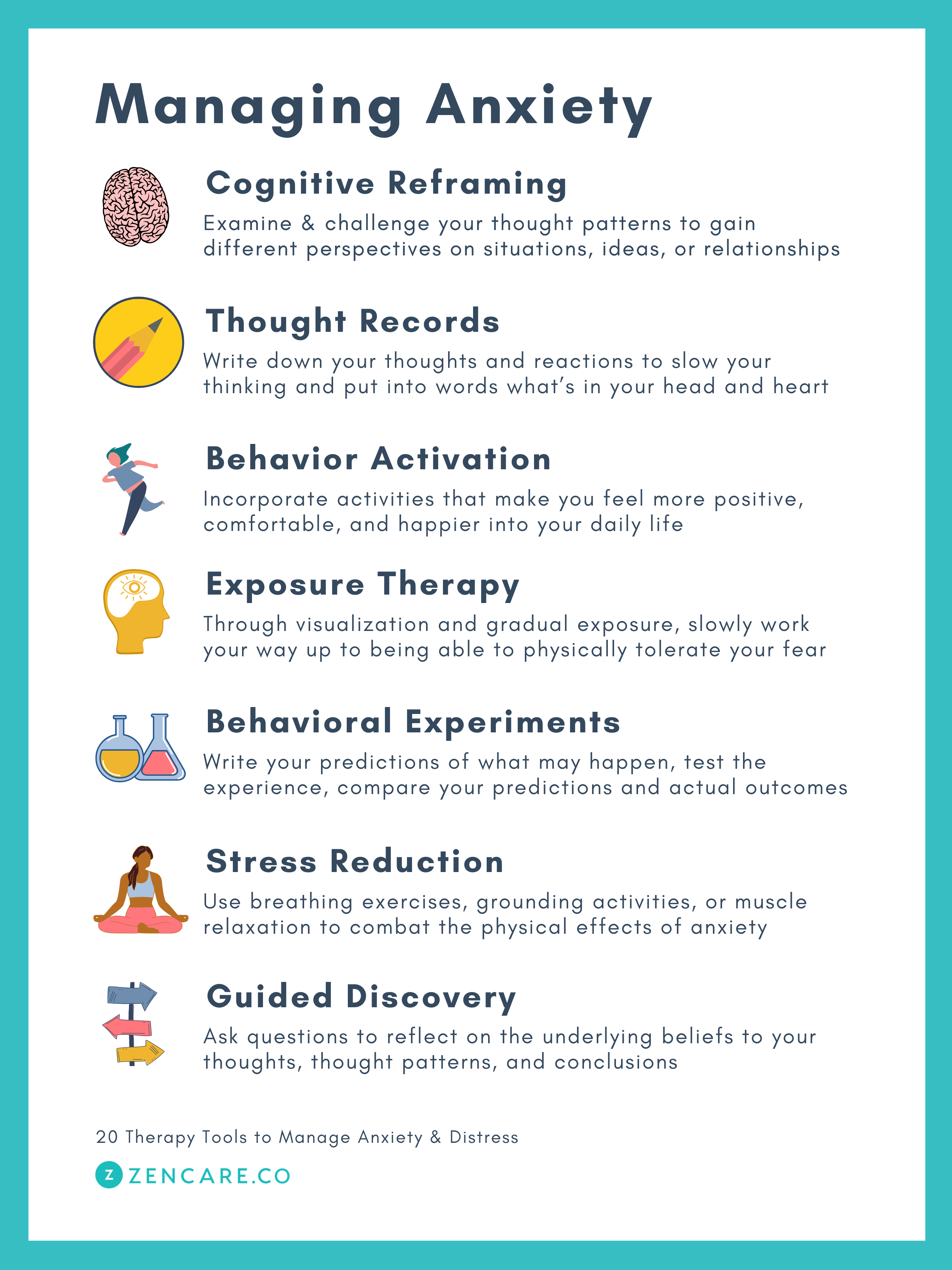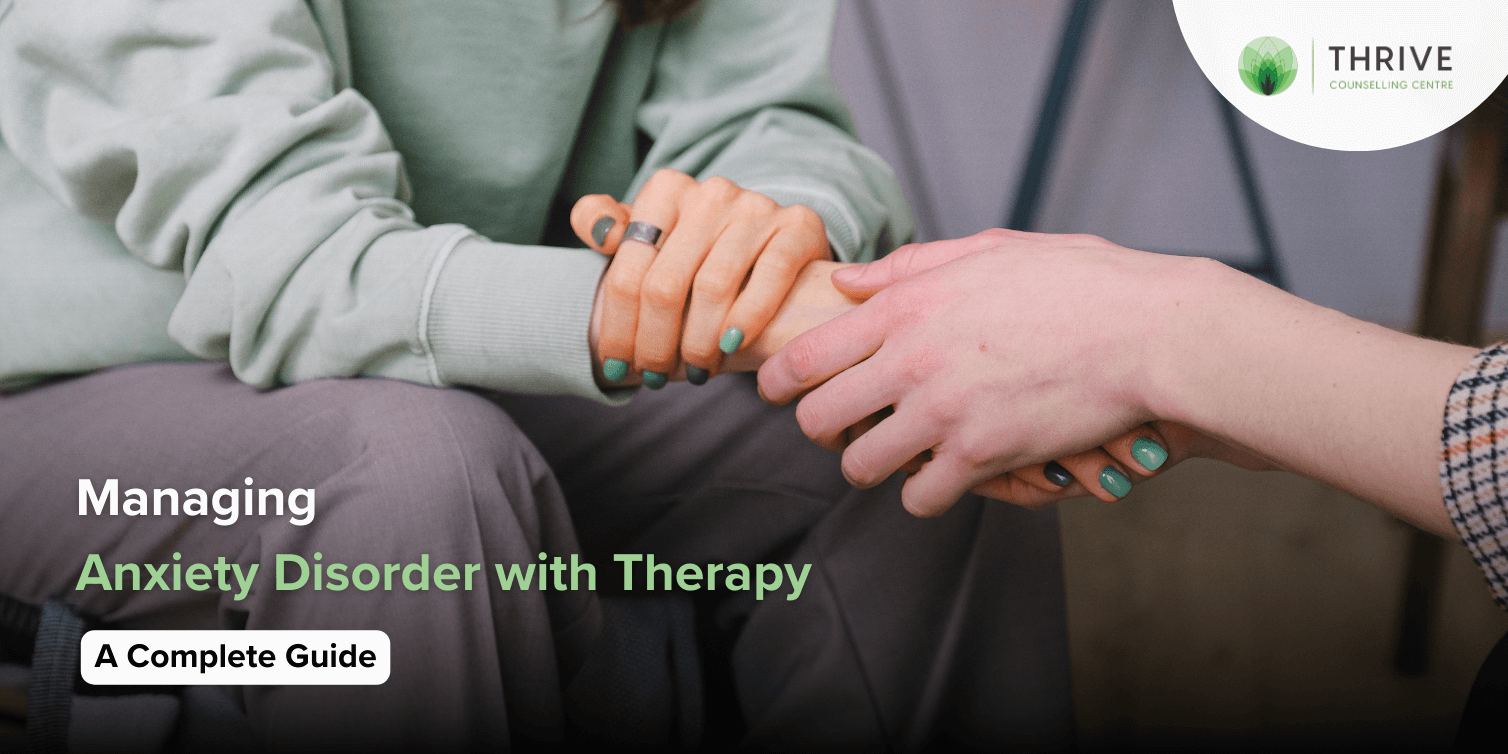Discover meaningful relief with a licensed therapist for anxiety you can trust
Checking Out Various Approaches in Therapy for Anxiousness Problem for Long-term Adjustment
When tackling anxiety conditions, it's vital to discover a selection of counseling approaches. Each technique uses unique insights and tools to aid you handle your symptoms properly. You might discover that incorporating strategies can yield the most effective outcomes. However, understanding the nuances of these techniques is crucial to cultivating lasting change. Suppose the ideal mix could launch a new level of emotional well-being for you?
Understanding Anxiety Disorders: A Brief Summary
Anxiety disorders, which influence countless individuals worldwide, can substantially influence life. You could experience overwhelming feelings of fear or stress that appear unmanageable. These feelings can lead to physical signs like a racing heart, sweating, and even wooziness. Typical kinds of anxiety problems consist of generalized anxiousness condition, panic condition, and social stress and anxiety disorder. Each has unique signs, yet they all share a propensity to interrupt your routine and relationships.Understanding the source of your stress and anxiety is important. It could originate from genes, brain chemistry, or life experiences. Recognizing your triggers can help you manage your responses better. It is essential to bear in mind that you're not the only one in this struggle. Numerous individuals face comparable obstacles, and looking for aid is a strong action towards feeling much better. By finding out about anxiousness disorders, you're currently on the course to understanding and handling your condition much more successfully.
Cognitive-Behavioral Treatment: Testing Unfavorable Idea Patterns

Recognizing Adverse Thought Triggers
Recognizing the details triggers behind your unfavorable thoughts can be necessary in managing stress and anxiety when you run into minutes of distress. Begin by taking notice of situations that prompt sensations of fear or anxiety. Is it a congested room, a future deadline, or a conversation with specific people? Take down these instances in a journal. This will aid you recognize patterns in your thinking. Likewise, notice physical feelings that accompany your unfavorable thoughts, like a racing heart or rigidity in your chest. By identifying these triggers, you get insight into what's sustaining your anxiety. Understanding these links is the primary step in testing those ideas and ultimately regaining control over your psychological reactions.

Replacing Thoughts With Positives
Challenging negative idea patterns is a vital action in transforming your attitude and reducing stress and anxiety. You might often discover on your own trapped in cycles of self-doubt or tragic reasoning. Rather than allowing these thoughts dictate your sensations, practice changing them with positive affirmations or sensible choices. When you assume, "I can't handle this," change it to, "I can handle challenges one action at a time." This basic change can considerably influence your mood. On a regular basis identifying and countering these adverse thoughts aids develop a much healthier interior discussion. Remember, it takes some time and effort, however constantly exercising this strategy can cause enduring adjustment, equipping you to deal with anxiety with renewed self-confidence and durability
Building Coping Strategies Together
Replacing adverse thoughts is just the start of taking care of anxiety properly. To produce lasting adjustment, you need to develop coping techniques that empower you. Cognitive-Behavioral Treatment (CBT) helps you determine and test those purposeless thought patterns. With each other, you and your counselor can discover how these ideas impact your sensations and behaviors.Start by developing sensible techniques, like journaling or mindfulness workouts, that enable you to confront stress and anxiety head-on. When you encounter your worries slowly, you'll learn to respond differently.

Mindfulness and Acceptance-Based Approaches: Growing Present-Moment Awareness
As you navigate the intricacies of anxiousness, integrating mindfulness and acceptance-based strategies can significantly boost your ability to cultivate present-moment awareness. By concentrating on the present moment, you'll find that you can observe your thoughts and feelings without judgment. This method helps you recognize your anxiousness without really feeling overwhelmed by it.Engaging in mindfulness workouts, such as deep breathing, body scans, or led meditations, permits you to ground on your own in your current experience. Acceptance-based methods urge you to accept your feelings instead of battle versus them. When you approve your feelings, they lose their power over you.Incorporating these methods into your day-to-day regimen can change how you react to stress and anxiety. You'll create resilience and learn to navigate stressful scenarios with better convenience. Inevitably, growing present-moment recognition lays the foundation for enduring adjustment, equipping you to lead a much more satisfying life.
Exposure Therapy: Confronting Fears Gradually
Direct exposure treatment helps you face your worries in a gradual way, making it much less frustrating. You'll learn techniques to encounter anxiety-provoking scenarios detailed, while also constructing coping strategies to handle your responses. This method empowers you to take control and minimize stress and anxiety gradually.
Progressive Exposure Methods
When dealing with anxiety, gradually facing your anxieties can be a powerful means to reclaim control. This strategy, recognized as progressive exposure, involves slowly revealing yourself to the situations or items that trigger your stress and anxiety. Begin with much less challenging scenarios and slowly function your way up to even more challenging ones. If you're scared of public talking, you might begin by talking in front of a mirror, after that progress to sharing thoughts with a friend, and ultimately resolve a small team. Each step aids desensitize you to the worry, constructing your self-confidence gradually. Bear in mind, it's vital to speed on your own and commemorate tiny success as you relocate through this process, enhancing your ability to handle anxiety successfully.
Structure Coping Strategies
Building efficient coping methods is important for taking care of anxiousness, especially as you face your concerns progressively. One powerful technique is direct exposure treatment, where you begin by encountering your anxieties in a controlled way. Begin with less daunting circumstances and slowly work your way as much as more difficult situations. This progressive exposure assists desensitize you to anxiousness activates, making them much less overwhelming.Incorporate leisure methods, such as deep breathing or mindfulness, to soothe your mind during exposure. Track your development, celebrating little triumphes along the means to enhance your self-confidence. Keep in mind, it's all right to take your time; the objective isn't excellence however stable improvement. By constructing these approaches, you'll encourage on your own to navigate anxiety and welcome life a lot more fully.
Psychodynamic Treatment: Discovering Source of Anxiousness
Psychodynamic therapy checks out the subconscious mind, exposing the source of your anxiety - Counseling services for anxiety. By examining your ideas, feelings, and previous experiences, this technique helps you reveal underlying problems and unsolved problems that might contribute to your existing stress and anxiety. You'll deal with a therapist to check out childhood years experiences, partnerships, and emotional patterns that shape your reactions today.As you acquire insight into these deeper layers of your mind, you'll begin to recognize exactly how past occasions influence your present behavior. This understanding can bring about catharsis, enabling you to refine feelings you might have suppressed.Through the therapeutic relationship, you can likewise recognize defense devices that might have established with time, providing a more clear course to change. Eventually, psychodynamic treatment outfits you with the tools to address your anxiousness at its core, advertising long-term makeover in your psychological well-being
Holistic and integrative Approaches: Incorporating Techniques for Greater Efficacy
Integrating different restorative methods can boost your trip toward taking care of anxiousness better. By incorporating aspects from cognitive-behavioral treatment, mindfulness methods, and alternative methods, you can develop a tailored strategy that resolves your unique needs. For example, you may utilize cognitive-behavioral techniques to challenge negative idea patterns while including mindfulness workouts to ground yourself in today moment.Additionally, exploring all natural techniques such as yoga exercise or meditation can advertise leisure and decrease stress and anxiety signs. This blend allows you to establish higher self-awareness and resilience.Experimenting with these varied techniques can aid you find what reverberates most with you. Bear in mind, it has to do with discovering a harmony that functions, instead of sticking to a single technique. This integrative technique not just provides instant alleviation yet additionally fosters long-lasting abilities for managing anxiousness, encouraging you to redeem control over your life.
The Duty of Assistance Equipments: Structure Durability Through Link
While it might appear that managing anxiety is a solitary trip, having a solid support system can play a vital function in your resilience. Bordering on your own with understanding close friends, family, or assistance teams creates a secure area where you here can freely share your experiences and feelings. You advise yourself that you're not alone in this struggle.These connections offer inspiration and can give sensible coping methods that have worked for others when you connect with others. It's also an opportunity to acquire perspective; good friends can aid you see scenarios in a different way, minimizing sensations of isolation.Moreover, emotional support fosters a sense of belonging, which can considerably alleviate anxiousness symptoms. By leaning on your support group, you can build resilience and deal with challenges more properly. Remember, connecting for help signifies stamina, and it can make all the distinction in your trip toward managing stress and anxiety.
Frequently Asked Inquiries
What Are the Common Signs of Stress And Anxiety Disorders?
You may experience restlessness, exhaustion, problem concentrating, irritation, muscle mass stress, and rest disturbances. Physical signs and symptoms can include rapid heartbeat, sweating, and trembling. Acknowledging these signs early can help you seek suitable support and therapy.

For How Long Does Therapy Typically Last for Stress And Anxiety Disorders?
Therapy for anxiousness disorders normally lasts anywhere from a few weeks to a number of months. It actually depends on your specific requirements, progress, and the techniques your specialist uses to assist you handle your stress and anxiety successfully.
Can Medication Be Used Alongside Treatment for Anxiousness?
Yes, medication can certainly be utilized alongside therapy for anxiousness. Incorporating both techniques frequently enhances treatment effectiveness, aiding you take care of signs while exploring underlying issues with therapy. Always consult your medical care supplier for personalized recommendations.
Exist Self-Help Techniques for Handling Stress And Anxiety?
Yes, there are a number of self-help approaches for managing anxiousness. You can exercise mindfulness, take part in normal workout, keep a well balanced diet plan, develop a routine, and utilize deep breathing strategies to aid decrease anxiousness signs and symptoms properly.
Exactly how Do I Know if I Required Expert Aid for Anxiousness?
You should think about looking for specialist help for stress and anxiety if it interferes with life, triggers substantial distress, or if self-help methods aren't functioning. Trust your instincts; connecting can result in better coping skills and support. Typical types of anxiety problems include generalised anxiety condition, panic problem, and social anxiety problem. When you experience moments of distress, identifying the particular triggers behind your adverse thoughts can be essential in taking care of stress and anxiety. Replacing adverse thoughts is only the start of taking care of stress and anxiety properly. By examining your thoughts, sensations, and previous experiences, this approach assists you discover underlying disputes and unsettled concerns that might add to your existing anxiety. It's likewise an opportunity to get viewpoint; close friends can help you see situations in different ways, decreasing sensations of isolation (Counseling services for anxiety).Moreover, psychological assistance cultivates a sense of belonging, which can greatly alleviate stress and anxiety signs and symptoms